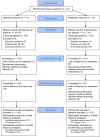Group hypnosis vs. relaxation for smoking cessation in adults: a cluster-randomised controlled trial
- PMID: 24365274
- PMCID: PMC3878029
- DOI: 10.1186/1471-2458-13-1227
Group hypnosis vs. relaxation for smoking cessation in adults: a cluster-randomised controlled trial
Abstract
Background: Despite the popularity of hypnotherapy for smoking cessation, the efficacy of this method is unclear. We aimed to investigate the efficacy of a single-session of group hypnotherapy for smoking cessation compared to relaxation in Swiss adult smokers.
Methods: This was a cluster-randomised, parallel-group, controlled trial. A single session of hypnosis or relaxation for smoking cessation was delivered to groups of smokers (median size = 11). Participants were 223 smokers consuming ≥ 5 cigarettes per day, willing to quit and not using cessation aids (47.1% females, M = 37.5 years [SD = 11.8], 86.1% Swiss). Nicotine withdrawal, smoking abstinence self-efficacy, and adverse reactions were assessed at a 2-week follow-up. The main outcome, self-reported 30-day point prevalence of smoking abstinence, was assessed at a 6-month follow up. Abstinence was validated through salivary analysis. Secondary outcomes included number of cigarettes smoked per day, smoking abstinence self-efficacy, and nicotine withdrawal.
Results: At the 6-month follow up, 14.7% in the hypnosis group and 17.8% in the relaxation group were abstinent. The intervention had no effect on smoking status (p = .73) or on the number of cigarettes smoked per day (p = .56). Smoking abstinence self-efficacy did not differ between the interventions (p = .14) at the 2-week follow-up, but non-smokers in the hypnosis group experienced reduced withdrawal (p = .02). Both interventions produced few adverse reactions (p = .81).
Conclusions: A single session of group hypnotherapy does not appear to be more effective for smoking cessation than a group relaxation session.
Trial registration: Current Controlled Trials ISRCTN72839675.
Figures
References
-
- Keller R, Radtke T, Krebs H, Hornung R. Der Tabakkonsum der Schweizer Wohnbevölkerung in den Jahren 2001 Bis 2010 [Tobacco Consumption in the Swiss Population from 2001 to 2010] Zürich: Psychologisches Institut der Universität Zürich, Sozial- und Gesundheitspsychologie; 2011.
Publication types
MeSH terms
Associated data
LinkOut - more resources
Full Text Sources
Other Literature Sources
Medical


